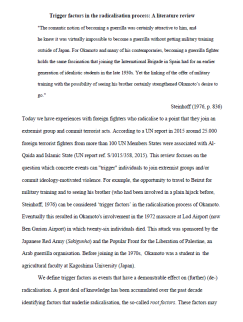This paper provides an integrative review of the role of trigger factors in the radicalisation process. Trigger factors are events that have a demonstrable effect on (further) (de-) radicalisation. Two different categories of trigger factors are proposed: Turning points and catalysts. ‘Turning points’ are events that make people susceptible for a new ideology or worldview. These trigger factors result in (further) radicalisation, but can also instigate a process of de-radicalisation. ‘Catalysts’ refer to events that speed up or slow down the radicalisation process. The mostly qualitative data are structured firstly across three different levels: the micro-level (the personal level), the meso-level (the group level), and the macro-level (the societal, (inter)national level). In addition we propose that typologies of radicalisation (i.e., identity seekers, justice seekers, significance seekers and sensation seekers) moderate effects of trigger factors. In addition, the available evidence from the literature suggests age, gender, education, and possible behavioral problems to be of importance, but to a different degree.
2018
